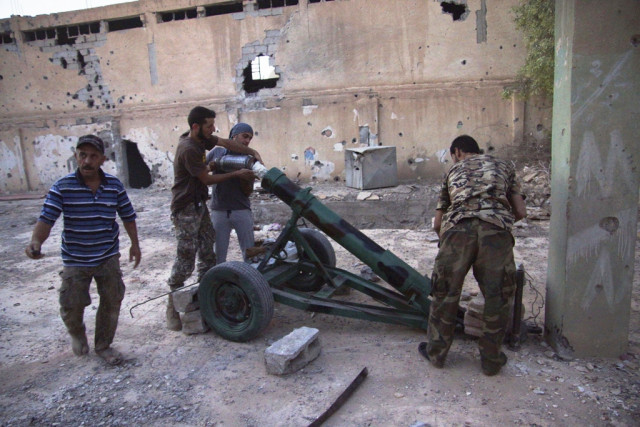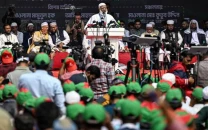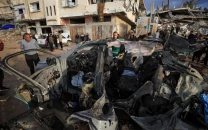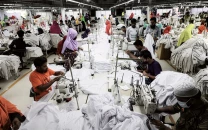France backs action on Syria as US seeks coalition
French president says his country wants firm and proportionate action against the Damascus regime.

Free Syrian Army fighters prepare to launch a rocket against forces loyal Syria's President Bashar al-Assad in Deir al-Zor August 29, 2013. PHOTO: REUTERS
The White House had signalled Thursday that President Barack Obama, guided by the "best interests" of the United States, was ready to go it alone on Syria after deadly chemical weapons attacks last week.
But Russia, the Syrian regime's most powerful ally, warned any military strikes would "deal a serious blow to the entire system of world order".
UN arms experts began a final day of inspections of the sites of the suspected gas attacks before they leave the war-battered country on Saturday and report their findings to UN chief Ban Ki-moon.
Faced with an impasse at the UN Security Council and the British parliament's shock rejection of any punitive action against the Syrian regime, the United States has been forced to look elsewhere for international partners.
While Germany and Canada ruled out joining any military strikes, Hollande - whose country was a strident opponent of the war on Iraq - said the British vote would not affect his government's stance.
"France wants firm and proportionate action against the Damascus regime," Hollande said in an interview with Le Monde newspaper, hinting an attack was possible by Wednesday.
US Defence Secretary Chuck Hagel said the White House respected the British vote and that it was still seeking an "international coalition that will act together" against Syria's regime.
"We are continuing to consult with the British as with all of our allies. That consultation includes ways forward together on a response to this chemical weapons attack in Syria," he said in the Philippines.
The British rejection also came after the failure of an 11th-hour effort by British diplomats to win UN backing for action against President Bashar al Assad's regime at a meeting of the permanent members of the Security Council.
"It is clear to me that the British parliament, reflecting the views of the British people, does not want to see British military action. I get that and the government will act accordingly," Cameron said.
His government was defeated by just 13 votes in its bid for a "strong humanitarian response" to Syria's alleged use of chemical weapons against its own people in the August 21 attacks.
Key Damascus allies Russia and Iran have warned against any Western intervention, saying it risked sparking a wider conflict in the already volatile Middle East.
But the military buildup was continuing in the region, while in Damascus the mood was heavy with fear and security forces were making preparations for possible air bombardments.
US warships armed with scores of cruise missiles are converging on the eastern Mediterranean, and US military officials have said they are ready to launch a powerful barrage against regime targets.
US National Security Council spokeswoman Caitlin Hayden said Obama's decision-making "will be guided by what is in the best interests of the United States.
"He believes that there are core interests at stake for the United States and that countries who violate international norms regarding chemical weapons need to be held accountable."
Envoys from the permanent Security Council members - Britain, China, France, Russia and the United States - met Thursday for the second time since Britain proposed a draft resolution to permit "all necessary measures" to protect Syrian civilians, but no breakthrough was reported.
Earlier in the week, reports had suggested a Western strike was imminent, but questions have been raised about the quality of the intelligence linking Assad to the gas attack.
Some members of Congress voiced support for limited, surgical strikes, while urging transparency from the administration and continued close consultations.
"It is clear that the American people are weary of war. However, Assad gassing his own people is an issue of our national security, regional stability and global security. We must be clear that the United States rejects the use of chemical weapons by Assad or any other regime," said Nancy Pelosi, the minority leader in the House.
Assad's ally and main arms supplier Russia has blocked all attempts to toughen sanctions against Damascus or authorise outside force to punish or unseat the regime.
And Deputy Prime Minister Gennady Gatilov said Friday his government opposes any resolution "indicating the probability of the use of force" or "that could be used for military action against Syria".
Syria is in the 29th month of a vicious civil war in which more than 100,000 people have died and about three million more have become refugees or displaced, according to UN figures.
As the stand-off continued, the team of UN inspectors were in the final day of their investigations into the gas attacks that activists say killed more than 350 people, including women and children.
A UN spokesman said Thursday that the team had collected "considerable" evidence and will brief the UN secretary general soon after they leave Syria on Saturday.
Ban has appealed for the inspectors to be allowed to complete their work before the major powers decide any follow-up action.
Assad, whose regime strongly denies using chemical weapons and instead blames "terrorist" rebels, has remained defiant in the face of the threats.
"Syria will defend itself in the face of any aggression," he said on Thursday, vowing "victory" for his people.
Israel deployed its Iron Dome missile defence system in Tel Aviv on Friday, reports said, amid fears Assad or his allies from the Hezbollah militia in Lebanon will retaliate against the Jewish state.



















COMMENTS
Comments are moderated and generally will be posted if they are on-topic and not abusive.
For more information, please see our Comments FAQ